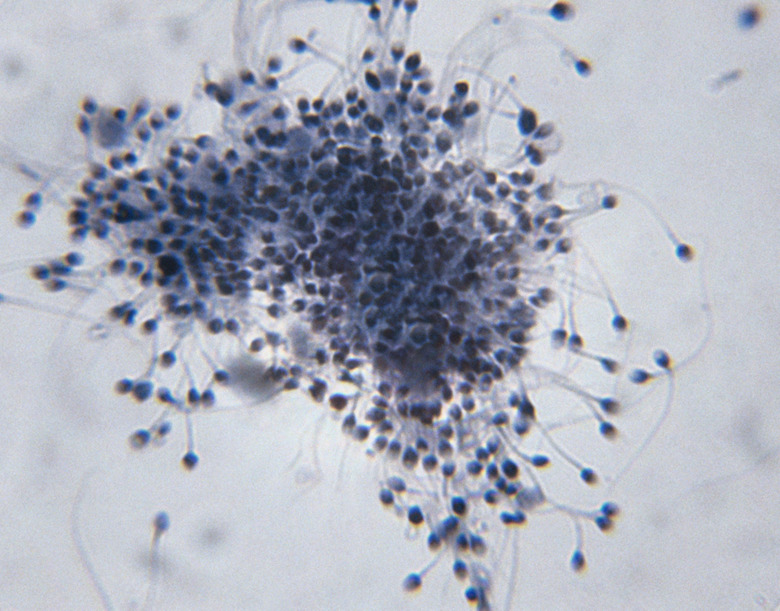When Is A Mutation In A DNA Molecule Passed To Offspring?
The natural process of copying DNA in human cells is very accurate, but mistakes do happen. Estimates of the mutation rate vary, but a 2011 study found that for every 85 million nucleotides assembled in DNA during human sperm or ova (egg) production, one will be a mistake: a mutation. The statistic concerns mutations in sperm and ova cell production because only mutations in these specific cells are passed on to the next generation.
TL;DR (Too Long; Didn't Read)
Mutations are only passed on to offspring when they occur in germ cell DNA, which are the cells that create sperm or ova. The other kind of cells, somatic cells, are the rest of the cells in the body, and mutations that occur in these cells do not get passed on to offspring. For every 85 million nucleotides assembled in DNA during human sperm or ova production, one will be a mutation. Since the humane genome is 6 billion nucleotides long, this still adds up to dozens of mutations per generation, but most are not significant enough to be detectable.
Some mutations are so severe that the embryo or fetus does not make it to term; in this case, the mutation has not been passed on. In other cases, life is viable with the mutation, but quality of life for the offspring suffers. If a germ cell has a mutation in its DNA, the sperm or ova it creates is still unlikely to be passed on to offspring. The mutation will be inherited only if it occurred on a chromosome in either the sperm cell or the ova cell out of many that eventually unite to form a zygote.
Somatic Cells
Somatic Cells
Human body cells fall into two broad categories: germ cells and somatic cells. Germ cells produce sperm and ova; all the other tissues of the body are somatic cells. A somatic cell mutation in an organism is passed on to daughter cells in the organism. But this type of mutation doesn't affect future generations because only genes carried by sperm or ova can become part of offspring's genetic material. A mutation in a germ cell, by contrast, will not affect the body, but will affect any offspring from the sperm or ova the germ cell creates.
Mutation Rates
Mutation Rates
Children typically inherit some mutations from their parents. The average mutation rate of 1 in 85 million nucleotides or genetic code letters during sperm or ova production may sound low. However, the human genetic code is 6 billion letters long. This mutation rate adds up to dozens of mutations per generation, although many of these mutations have no detectable effect. In general, scientists think that sperm cell DNA carries more mutations than ova cell DNA because females are born with all of the ova they will ever have, but males make new sperm continuously throughout their lifetimes, allowing for more errors with time.
Lethal Mutations
Lethal Mutations
Sometimes, a mutation is so severe it's lethal; a fetus carrying this type of mutation never reaches full term. Many miscarriages, for example, are caused by serious mutations or chromosomal rearrangements that prevent the fetus from developing normally. In these cases, although a mutation occurred in a germ cell, it is not passed to the offspring because the offspring was not born. In other cases, mutations cause birth defects that while not lethal, are serious and can wreak havoc on the offspring's quality of life.
No Certainty
No Certainty
The process of cell division that makes sperm and ova cells is complicated. It would be incorrect to assume that all mutations that occur in any germ cell will be inherited. The specific sperm or ova cell carrying a mutation has to battle great odds among the large numbers of sperm and ova before it can become part of a new organism. The mutation will be passed on only if it occurred on a chromosome in either the sperm cell or the ova cell that unite to form a zygote.
Cite This Article
MLA
Brennan, John. "When Is A Mutation In A DNA Molecule Passed To Offspring?" sciencing.com, https://www.sciencing.com/mutation-dna-molecule-passed-offspring-2346/. 7 May 2018.
APA
Brennan, John. (2018, May 7). When Is A Mutation In A DNA Molecule Passed To Offspring?. sciencing.com. Retrieved from https://www.sciencing.com/mutation-dna-molecule-passed-offspring-2346/
Chicago
Brennan, John. When Is A Mutation In A DNA Molecule Passed To Offspring? last modified March 24, 2022. https://www.sciencing.com/mutation-dna-molecule-passed-offspring-2346/
